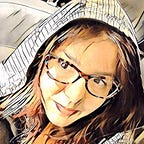You Are Here
When you’re on a big campus, in a museum, a zoo, or a shopping center, it’s a comforting thing to see — the kiosk with the big diagram that maps the entire facility you are in. And there, right there, you can see it — the big, friendly dot with large friendly letters that read, “You are here.” Before we started carrying smartphones with mapping functions (which will present you with a dot on a map on demand), there were not many times in your life where you had such a comprehensive and helpful indicia of your position relative to all the other things in your orbit.
If you’re lucky, somewhere in your past — through scouting or some kind of “wilderness experience” or even military training — you had some instruction in the practice of “orienteering.” Orienteering pretty much looks the same no matter who’s teaching it to you. You are given a map and a compass, a few bits of instruction, and then promptly dropped into the middle of nowhere and told to find your way to a predetermined spot a few miles away. Some people find the exercise exhilarating, and others are terrified beyond reason. Nearly always during this exercise there is one team so benighted in their innate ability to orient themselves that they do not arrive at the agreed upon location until well after dark.
In the age of Google Maps we take for granted that we know where we are, that we are properly oriented in our world. Until, of course, something strips that understanding away from us. Maybe it’s losing a loved one. Maybe it’s a sudden disruption in your career. Maybe it’s a disaster of some kind that places a key need in jeopardy — a fire that takes your home or an illness that takes your mobility. Sometimes it’s just good old fashioned depression. Whatever the reason, we suddenly lose our sense of direction, our feeling of knowing where we are and how we fit in the world.
The thing is, none of us exists in isolation. We live in context, and that context is a web of relationships, of activities, of responsibilities. We are born into a family. We grow up in a community. Over time we discover our skills and our interests, and find our place as an adult in a career, in a hobby, with a community of friends. We have our own families — a web of spouses, children, in-laws and so on. Even if not all of those relationships are positive in their impact on your life, the web of humanity in which we are enmeshed from birth provides a key sense of being oriented in the world. We can grasp who we are because we see that person in the context of what we do and who we do it with.
This is true even when people are born into families where they feel like a “black sheep” who doesn’t fit in. We grow up in towns that we feel we don’t belong in and long to grow up so we can move away. We sometimes create friendships based not on shared interests or values but rather proximity. The truth is that sometimes we know who we are not because of how we fit with the people around us, but by identifying the ways that we don’t fit.
We are living in a period where the disorientation is palpable. The COVID-19 pandemic has killed over 750,000 Americans, and that’s 750,000 families who have lost a son, a mother, a grandparent, an uncle. People are struggling as workplaces adapt to a new normal in terms of doing business, and as what we do all day and who we’re doing it with has radically shifted. Political polarization and disinformation has made what was once one of the most reliable democracies on the planet suddenly feel unsteady and fragile. Knowing who you are, where you are, and where you fit in the world is hard right now. Lots of things that we’re used to relying on to orient us in the world have shifted, or been eliminated altogether.
And now we’re coming to Samhain. It’s the time when the veil gets thin, as they say. And that means that we start to feel the world beyond impinging on our existence. The presence of ancestors. The presence of our Mighty Dead. We start to feel the coming dark part of the year descend. That can really mess with your head, because the science is clear — humans start to get a little more anxious when they aren’t getting enough regular sunlight. Seasonal Affective Disorder (SAD) is a real thing that affects people’s well-being. The liminality of Samhain is a real thing if you are witchy and aware of what’s happening around you.
But here’s the thing — the relationships that we are enmeshed in, the ones that tell us who we are and where we belong? They include those beyond the Veil. The ability to connect to our ancestors, to our Mighty Dead, offers the opportunity to root ourselves in our own personal history. The past, even the dead and gone past, is connected to the present, and even to the future, because of you and your relationship to it. This time is your opportunity to stretch a thread into the past, into the places beyond, and use it to show you where you are. It is an opportunity to cast threads into the relationships you have around you, and use the place where all those threads meet be your understanding.
In a time where there s still so much disorientation, a simple effort to put yourself in context can help you meet the moment we’re in.
You. Are. Here.
